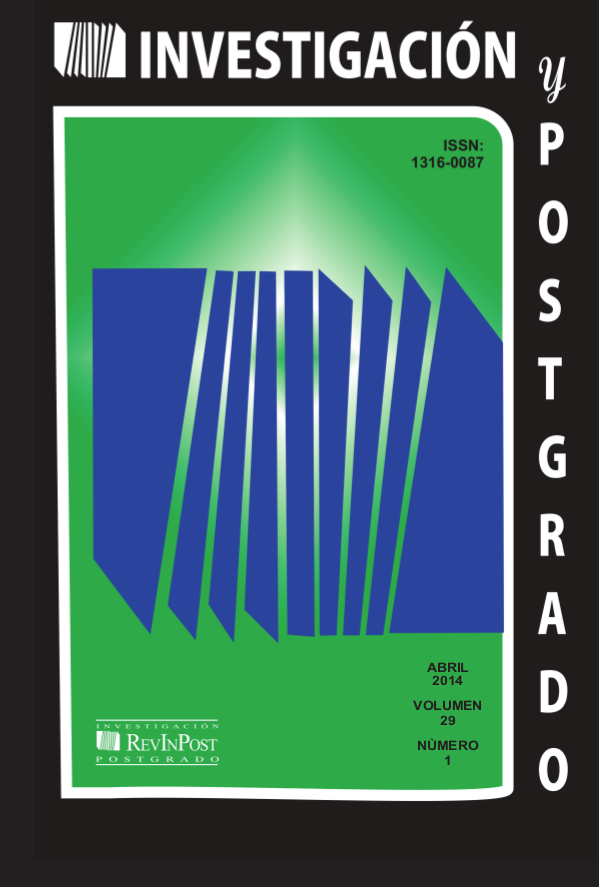USE OF TECHNOLOGIES OF INFORMATION AND COMMUNITACION WITHIN THE FRAMEWORK OF POSTGRADUATE CURRICULA
Keywords:
needs of training, technologies of information and communication, curricula frameworkAbstract
The purpose of this article is to publish some of the findings related to the investigation of the need of training of faculty within the framework of postgraduate curricula and with support of the technologies of information and communication. The objective of this investigation is to set the areas where the technologies of information and communication are to be used within the framework of postgraduate curricula. Methodologically, this field investigation is classified within a descriptive, multi-field, and exploratory paradigm. In the investigation, the technique used to gather information was the survey and the instrument used was the questionnaire. The results of the data-gathering process highlighted that 50% of the population said that they have “ never” or “hardly ever” used the technologies of information and communication as purpose of investigation; therefore, it is imperative the training of faculty in this area.
Downloads
References
Arias, F. (2004). El Proyecto de Investigación: introducción a la metodología científica. Caracas: Episteme.
Arnaz, J. (1981). La Planeación Curricular. México: Trillas.
Cabero, J. (2004). Cambios organizativos y administrativos para la incorporación de las TIC en la formación: Medidas a adoptar. EDUTEC Revista Electrónica de Tecnología Educativa, 18. [Revista en Línea]. Disponible: http://www.uib.es/depart/gte/edutec-e/revelec18/cabero_18. htm [Consulta: 2012, Marzo 13]
Casarini, M. (1997). Teoría y diseño curricular. México: Trillas.
Cerda, H. (1991). Los elementos de la investigación. Bogotá: El Búho.
Cuckierman, U. y Virgili, J. (2010). La Educación en el siglo XXI: los desafíos de la era digital. [Documento en Línea]. Disponible: http://www.edutecne.utn.edu.ar/teset/tec nol_educativa_cukierman_virgili.pdf [Consulta: 2011, Marzo 03]
García, L. (2001). La educación a distancia: de la teoría a la práctica. Madrid: Ariel Educación.
García, L. (2003). Requerimientos de los sistemas de enseñanza a través de redes digitales. [Libro en Línea] Disponible: http://www.uned.es/catedraunesco-ead/editorial/p7-6-2003.pdf [Consulta: 2011, Marzo 06]
Gimeno, J. (1991). El Currículum: una reflexión sobre la práctica. Madrid: Morata.
González, A. (1998). Más allá del currículo: la educación ante el reto de las nuevas tecnologías de la información y la comunicación. [Documento en Línea]. Disponible: http://www.ice.urv.es/modulos/modulos/aplicaciones/apgs.htm [Consulta: 2011, Febrero 08]
Hernández Sampieri, R., Fernández Collado, C. y Baptista Lucio, P. (1998). Metodología de la investigación. México: McGraw-Hill.
Mata, F. (2002). Universidad y tecnologías de la información y la comunicación: implicaciones prácticas. II Congreso Europeo de Tecnologías de la Información en la Educación y en la Ciudadanía: Una visión crítica. [Documento en Línea]. Disponible: http://web.udg.edu/tiec/posters/cp29.pdf [Consulta: 2011, Enero 29]
Núñez, L. (2008). E-Investigación: una nueva manera de producir conocimiento. [Documento en Línea]. Disponible: www.saber.ula.ve [Consulta: 2011, Febrero 06]
Orta, A. (1999). El desarrollo curricular como proceso dinámico de acción docente. Caracas: FEDUPEL.
Prensky, M. (2008). El papel de las tecnologías en la enseñanza y en el aula. Journals Educational Technology, 13.
Ruiz, C. (1998). Instrumentos de investigación educativa: procedimiento para su validación. Barquisimeto: CIDEG.
Salinas, J. (2005). Innovación docente y uso de las TIC en la enseñanza universitaria. Revista de Universidad y Sociedad del Conocimiento, 1(1) [Revista en Línea]. Disponible: http://redalyc.uaemex.mx/src/inicio/ArtPdfRed.jsp?iCve=78011256001 [Consulta: 2011, Enero 25]
UNESCO. (2009). ICT competency standards for teachers: competency standards modules. UNESCO document CI.2007/WS/19.Cataloge156207
Universidad Pedagógica Experimental Libertador-Instituto de Mejoramiento Profesional del Magisterio. (1999). Programa Formación de Tutores del IMPM. Caracas: Autor.
Universidad Pedagógica Experimental Libertador (2008). Reglamento del Personal Académico de la Universidad Pedagógica Experimental Libertador. Caracas: Autor.
UPEL-IMPM. (2011). Documento base del Currículo de la Universidad Pedagógica Experimental Libertador. Caracas: Autor.
Downloads
Published
How to Cite
Issue
Section
License
Copyright (c) 2014 Universidad Pedagógica Experimental Libertador

This work is licensed under a Creative Commons Attribution-NonCommercial-ShareAlike 4.0 International License.
Investigación y Postgrado está bajo una licencia internacional Creative Commons Attribution-NonCommercial-ShareAlike 4.0 .
La política de acceso abierto y de licencias con “algunos derechos reservados” no niega la propiedad intelectual ni los derechos de los autores respecto a sus artículos, al contrario, los respeta. Es por ello que:
No se reservan los derechos de publicación de los artículos. Los autores podrán distribuir su artículo en cualquier otro medio, siempre y cuando sea sin fines de lucro. Debe informar al Editor de esta nueva publicación y debe dar el crédito a la revista Investigación y Postgrado.













